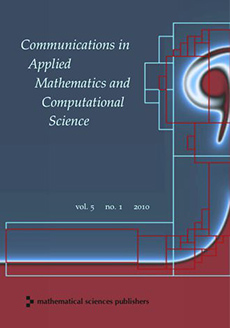Abstract
The overall effectiveness of finite element methods may be limited by solutions that lack smoothness on a relatively small subset of the domain. In particular, standard least squares finite element methods applied to problems with singular solutions may exhibit slow convergence or, in some cases, may fail to converge. By enhancing the norm used in the least squares functional with weight functions chosen according to a coarse-scale approximation, it is possible to recover near-optimal convergence rates without relying on exotic finite element spaces or specialized meshing strategies. In this paper we describe an adaptive algorithm where appropriate weight functions are generated from a coarse-scale approximate solution. Several numerical tests, both linear and nonlinear, illustrate the robustness of the adaptively weighted approach compared with the analogous standard least squares finite element approach.
Citation
Brian Hayhurst. Mason Keller. Chris Rai. Xidian Sun. Chad R. Westphal. "Adaptively weighted least squares finite element methods for partial differential equations with singularities." Commun. Appl. Math. Comput. Sci. 13 (1) 1 - 25, 2018. https://doi.org/10.2140/camcos.2018.13.1
Information





